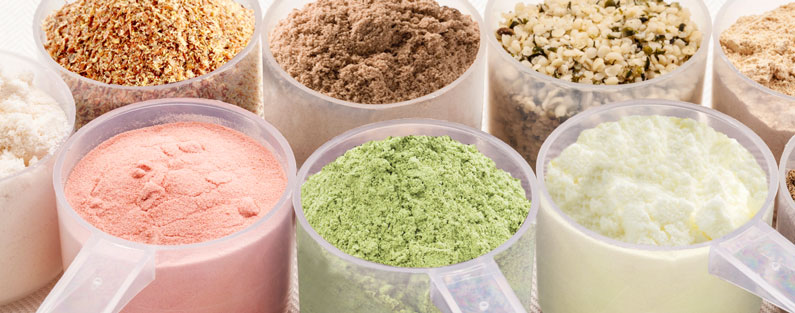|
Protein, it's in just about everything we eat. Whether it's a complete protein profile or you are eating large quantities of food to gain that complete profile. On a daily basis I get asked one question; "How much protein should I take?" Now here is the first issue with that question, I don't know what your goal is. What you are working to achieve makes a difference on how much protein you intake. Before I get into how that works and how to find it, let's take a look at what protein is, how it works in the body, and how to utilize it properly. WHAT IS PROTEIN? Okay, for starters knowing what you are putting into your body is crucial. Knowing what protein is actually made of is also crucial. By then end of this you may be shocked to find out you could be taking in too much protein. So if you are someone who drinks BCAA's before, during and after your workout and then consumes a protein shake I am going to assume you don't eat well throughout the day. Amino acids, or BCAA's as most people know them, are the foundation and building blocks of protein. They make up protein. Amino acids are small units linked together to form a long chain. There are about 20 different amino acids that come together to form protein, each of which has it's own important role in the body itself. WHAT KIND OF PROTEIN SHOULD I TAKE? This is a great question, the answer is also simple. -What are you? Vegetarian? Pescatarian? Carnivore? These make a difference when it comes to the selection of your protein or protein supplement. The way your body digests food makes a difference on the type of protein you should be taking in. There is also a simple answer for why, different sources of protein digest and react differently with everyBODY. By the way, did you know that protein is in nearly everything? Including fruits, vegetables, plants, dairy, eggs, and even grains. WHEN IS THE BEST TIME TO TAKE PROTEIN? Studies have changed so many times over the years I have been in the industry, some have stated that you have a 30 minute window to drink or consume your gains. Others have told me I have two hours and others still, more recently, have shown and told me that I have a 24 hour window to get the proper amount of gains in. So here's the deal, I'm not going to give you a link for this I am going to share my personal experience. I have been a meat-eater before and vegan before. In my experience neither made a difference on when I was eating, just how much I ate. Consuming the proper amount is more important than the timeframe in which it consumed. Granted, I found the best time to consume my protein was in fact within a 30-60 minute window after my workout, otherwise not only was my body tapping into the fat left on me but if I waited too long past that hour I would get shaky and angry. If I ate before or consumed some protein during I would get sick. So here's the deal, listen to your body on this one. WHAT IS THE RIGHT AMOUNT OF PROTEIN FOR ME? Now this LARGELY depends on what your goals are, more and more studies are finding the proper average amount of protein intake daily is roughly .36g per pound that you weigh, for the average sedentary woman, or 46 grams per day. Obviously for men this will be a bit higher intake. However if you are active you will want to increase accordingly. This means that if you are very active, go to the gym several days a week and hitting at least a good solid 30-45 minutes of straight exercise, you will want to increase your intake between 1 and 1.2g per pound you weigh. WHAT ARE THE DANGERS OF TOO MUCH PROTEIN? Oh yes, they are dangers of too much protein. Don't be fooled into thinking that a high protein diet is the best way to gain muscle; it may be one of the quickest, however, it is not one of the best. For starters an excess of un utilized and broken-down protein will turn into fat in turn causing fat gain rather than fat loss which is the opposite of what most gym-goers are looking to achieve. Excess fat gain is fuel for cancer cells, inflammation, sickness, weak immune systems, slow cardiovascular systems, deteriorating bones, ashy skin, and many other issues that arise from excess fat. Why? Fat messes with the body's hormones and homeostasis when there is an over abundance. Other dangers of too much protein include dehydration, constipation, diarrhea, kidney failure/damage, cardiovascular disease, and even the eating away of calcium in your bones, leaving them frail and brittle. CONCLUSION There are no doubts in my mind, nor any studies that disprove, just how essential and important protein in fact is to our diets. However we should be mindful and watch our intake versus our goals. Knowing those few things can change the way your body changes and adapts to your new lifestyle or diet. image source: http://www.kulturizmas.net/forumas/p1032059
1 Comment
|
Note from the Team.The blog about everything from mindful eating to healthy fat loss, drugs, natural supplementation and more! Archives
November 2021
Categories
All
|
HoursSession Hours
Sun-Fri 5AM- 1PM Coaching Contact Hours All days 5am-5pm Closed for sessions Tuesday & Saturday |
Telephone737-781-3349
|
|

 RSS Feed
RSS Feed